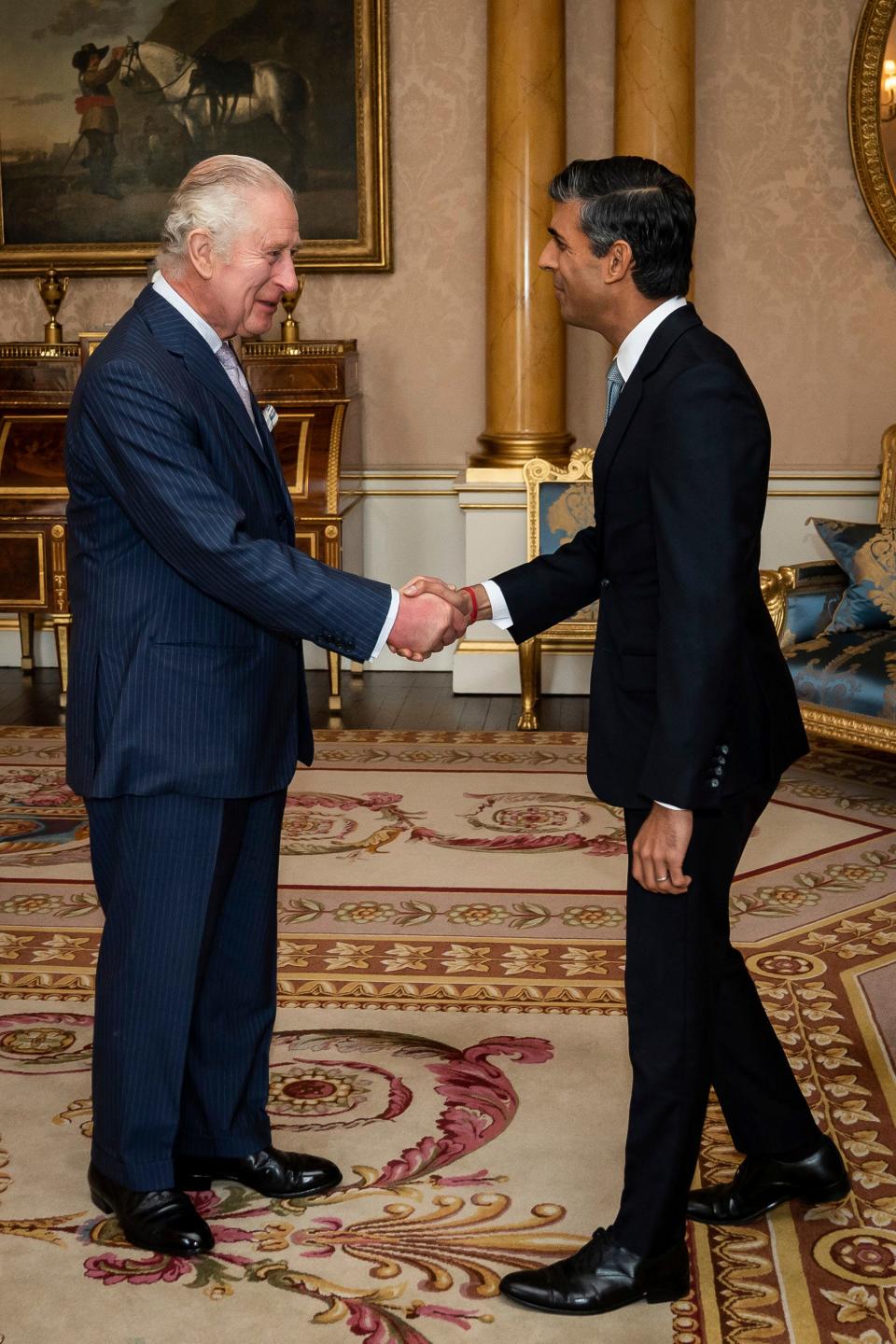Britain's new Prime Minister Rishi Sunak warns nation over 'profound economic crisis'
LONDON – Britain's new prime minister, Rishi Sunak, warned Tuesday of "difficult decisions" to come as the country faces a "profound economic crisis."
Sunak was speaking to the media outside his office and residence at No. 10 Downing St. shortly after officially taking over as Britain's leader from Liz Truss. Earlier in the day, he met with King Charles III at Buckingham Palace, where he received symbolic permission to take up the role during a ceremony known as the "kissing of the hands."
In his address, Sunak vowed to "fix" errors he said were made by Truss, who shocked financial markets by attempting to stimulate Britain's anemic economic growth rate by rolling out hyper-aggressive tax cuts at a time of spiraling inflation. Truss resigned 45 days into office, making her tenure the shortest in British history.
Liz Truss last 45 days in prime minister's office: Here's why she resigned
"Some mistakes were made," Sunak said. "Not born of ill will or bad intentions. Quite the opposite, in fact, but mistakes nonetheless. And I have been elected as leader of my party and your prime minister, in part to fix them."
Sunak's speech lasted just under six minutes. He stressed he would bring a different approach to government than his predecessors Truss and Boris Johnson, who resigned in July with allegations of misbehavior hanging over his head. Sunak said he would foster an environment that valued "integrity, professionalism and accountability."
Financial markets responded positively to Sunak's first full day in office. The pound currency, in free fall for weeks, added value against the dollar. The cost of buying British government bonds, known as "gilts," also dropped.
Who is Rishi Sunak?
Sunak comes to his new job with a lot of firsts: the first person of color to be a British prime minister, first of South Asian descent and first practicing Hindu.
At 42, he is also the youngest U.K. prime minister of modern times. And perhaps also the wealthiest.
Sunak's wife, tech heiress Akshata Murty, is the daughter of the founder of Infosys, an Indian tech firm. The couple have an estimated wealth of almost $1 billion, according to the Sunday Times Rich List. That makes him super rich, richer even than the king, who has an estimated personal fortune of $600 million, according to Forbes. (Sunak is not wealthier than the institution he manages – the monarchy. Forbes estimates the monarchy has total assets amounting to about $42 billion.)
Sunak, who was finance minister in Johnson's government until he resigned in July, offered no specific policy prescriptions for an economy whose growth rate has lagged all other G-7 nations compared with pre-coronavirus pandemic levels.
Britain's economy is now 0.2% smaller than it was before the pandemic, according to the Organization for Economic Co-operation and Development. By comparison, the U.S. economy is 3.5% larger today than it was in the fourth quarter of 2019, per the OECD. In September, annual inflation in Britain hit a 40-year high, at 10.1%.
Though Britain is not overly reliant on Russian gas, which is scarcer and more expensive because of Moscow's war on Ukraine, the government has had to intervene to prevent average household energy costs from soaring beyond $3,500 a year.

Mortgage borrowing costs in Britain have risen, too, as they have around the world as central banks have tightened monetary policy to ward off inflation by raising interest rates. But the Bank of England said they were driven even higher because of Truss' tax-cut proposal, which rattled markets because she did not offer a plan to offset them with spending cuts.
British media seemed none the wiser on Sunak's detailed next steps.
"He believes growth does not come from unfunded tax cuts or expanding the role of the state," wrote Freddie Hayward in a morning newsletter for The New Statesman magazine. "It comes from, he believes, creating the conditions for the private sector to grow."
The fine print on Sunak's overarching plan to mitigate Britain's economic woes is likely to be revealed Nov. 17, when his government sets out its medium-term fiscal plan.
For her part, Truss struck a largely unrepentant tone in her farewell address Tuesday.
"As the Roman philosopher Seneca wrote: 'It is not because things are difficult that we do not dare. It is because we do not dare that they are difficult,'" she said before handing in her resignation to the king. "We simply cannot afford to be a low growth country where the government takes up an increasing share of our national wealth."
This article originally appeared on USA TODAY: British Prime Minister Rishi Sunak pledges to 'fix' broken economy
